最新苏教版译林英语7A-Unit-3知识点
译林版初一英语7A Unit3 Welcome to our school! 知识点讲解
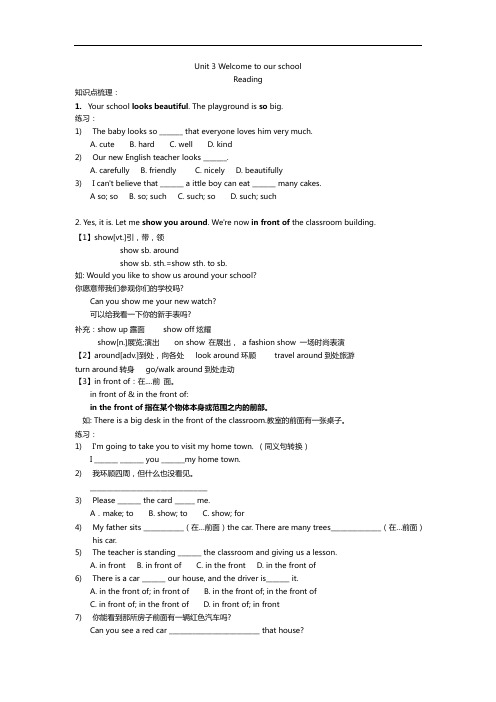
Unit 3 Welcome to our schoolReading知识点梳理:1.Your school looks beautiful. The playground is so big.练习:1)The baby looks so _______ that everyone loves him very much.A. cuteB. hardC. wellD. kind2)Our new English teacher looks _______.A. carefullyB. friendlyC. nicelyD. beautifully3)I can't believe that _______ a ittle boy can eat _______ many cakes.A so; so B. so; such C. such; so D. such; such2. Yes, it is. Let me show you around. We're now in front of the classroom building.【1】show[vt.]引,带,领show sb. aroundshow sb. sth.=show sth. to sb.如: Would you like to show us around your school?你愿意带我们参观你们的学校吗?Can you show me your new watch?可以给我看一下你的新手表吗?补充:show up露面show off炫耀show[n.]展览;演出on show 在展出,a fashion show 一场时尚表演【2】around[adv.]到处,向各处look around环顾travel around到处旅游turn around转身go/walk around到处走动【3】in front of:在....前面。
译林版初一英语7A Unit3 Welcome to our school! 知识点汇总

7A Unit 3 Welcome to our school!一、精选词汇哪一个which因此,所以(连词) so 当然sure如此,这么;非常so 大门gate明亮的bright 现代的,新式的modern建筑物,房子,楼房building生物biology地理geography历史history引,带,领show到处,向各处around领某人参观show sb.around.最好的best 一切顺利all the best前面front在…前面in front of走路,步行on foot地,地面ground英:底层,一楼=美:firstfloor、groundfloor墙wall礼堂,大厅hall日期date 日记diary 信,函letter 看一看look at让我想想 let me see下课后after class什么,请再说一遍pardon电话phone通电话 on thephone会议;集会meeting从...到... from...to...需要...时间,费时t ake只,只有,仅only 起床get up种类kind各种各样的all kinds of借,借用borrow向...借... borrow...from...不多,少数few一些,少量a few离开,远离away远离far away from二、短语归纳on foot 步行far away from 远离a few 一些,少量learn about 学得,获知would like sth. / to do sth. 想要/想要做某事after class 下课后on this day 在今天all kinds of 各种各样on the phone 在电话中look at 看ground floor 底层,一楼on the wall 在墙上by bus 乘公共汽车in front of 在……前面let me see 让我看看go to school 去上学reading room 阅览室borrow from 从……借……get to school 到达学校on the Open Day 在开放日用法集萃Thank you for doing sth. 为做某事而感谢你be ready to do sth. 准备做某事It takes sb. some time to do sth. 花费某人多少时间做某事show sb. around 领某人参观need to do sth. 需要做某事三、必背句子Welcome to our school.欢迎来到我们学校。
译林版初一英语7A Unit3 Welcome to our school! 知识点总结
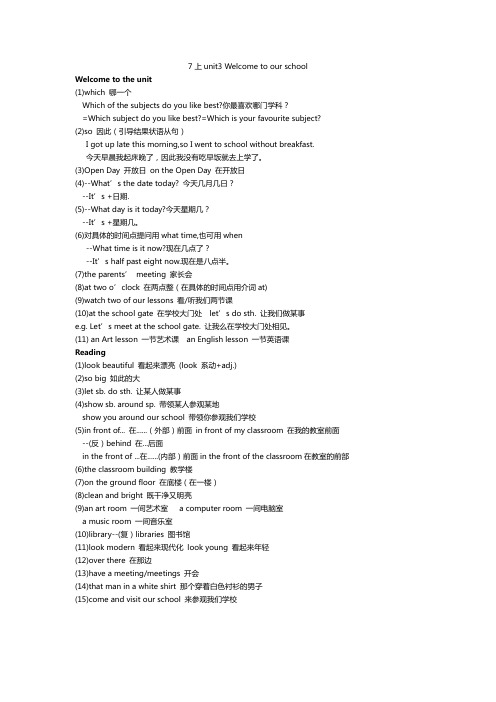
7上unit3 Welcome to our school Welcome to the unit(1)which 哪一个Which of the subjects do you like best?你最喜欢哪门学科?=Which subject do you like best?=Which is your favourite subject?(2)so 因此(引导结果状语从句)I got up late this morning,so I went to school without breakfast.今天早晨我起床晚了,因此我没有吃早饭就去上学了。
(3)Open Day 开放日on the Open Day 在开放日(4)--What’s the date today? 今天几月几日?--It’s +日期.(5)--What day is it today?今天星期几?--It’s +星期几。
(6)对具体的时间点提问用what time,也可用when--What time is it now?现在几点了?--It’s half past eight now.现在是八点半。
(7)the parents’meeting 家长会(8)at two o’clock 在两点整(在具体的时间点用介词at)(9)watch two of our lessons 看/听我们两节课(10)at the school gate 在学校大门处let’s do sth. 让我们做某事e.g. Let’s meet at the school gate. 让我么在学校大门处相见。
(11)an Art lesson 一节艺术课an English lesson 一节英语课Reading(1)look beautiful 看起来漂亮(look 系动+adj.)(2)so big 如此的大(3)let sb. do sth. 让某人做某事(4)show sb. around sp. 带领某人参观某地show you around our school 带领你参观我们学校(5)in front of... 在......(外部)前面in front of my classroom 在我的教室前面--(反)behind 在...后面in the front of ...在......(内部)前面in the front of the classroom在教室的前部(6)the classroom building 教学楼(7)on the ground floor 在底楼(在一楼)(8)clean and bright 既干净又明亮(9)an art room 一间艺术室 a computer room 一间电脑室a music room 一间音乐室(10)library--(复)libraries 图书馆(11)look modern 看起来现代化look young 看起来年轻(12)over there 在那边(13)have a meeting/meetings 开会(14)that man in a white shirt 那个穿着白色衬衫的男子(15)come and visit our school 来参观我们学校Grammar/Integrated skills/Task(16)人称代词主格与宾格人称代词宾格一般放动词和介词后使用,作宾语(17)tell sb. about sth. 告诉某人关于某事(18)play with sb. 和某人一起玩(19)after class 课后(20)at home 在家(21)say hello to sb. 向某人问好say Good morning to sb./say Goodbye to sb.向某人说早上好/再见(22)hear 听到(强调听的结果)listen to...听........(强调听的动作或过程)e.g. I listen to my teacher carefully in class ,but I can’t hear it clearly.在课堂上我仔细的听老师讲课,但是我听不清楚。
七年级上册英语(苏教版七年级)7AU3 Reading知识点

7AU3 Reading知识点一.词组:1.看起来很漂亮2.如此大3.带领某人参观(某地)...4.在...前面5.教学楼6.在底层7.干净又明亮8.这边走。
9. 一个美术教室10.一个音乐教室11.两个电脑房12.看上去现代化13.那边的大楼14.学校礼堂15.开会16.我明白了,我知道了。
17.穿着白衬衫的那个人18.让我们去礼堂吧。
19.在教学大楼后面20.这个学校有一个新的图书馆。
21.这个学校没有礼堂。
22.在开放日吴老师穿着一件白色衬衫。
23.米莉的语文老师24.许多书25.去那里26.在那里开会27.我们大家多喜欢它。
二.知识点:1. (1)show sb. around sp. 带领某人参观某地你们学校如此漂亮。
请带我们参观一下。
Your school is so beautiful. Please show us around it.(2) show sb sth=show sth to sb 把某物展示给某人看把你的照片给我们看看show us your pictures/ photos(3) show sb the way to (给某人)指引去…的路你能指给我去邮局的路吗?Can you show me the way to the post office?2. in front of 在…的前面我们教室前面有许多大树。
There are a lot of big trees in front of our classroom.他坐在我前面。
He sits in front of/ before me.in front of---反义词:behind★in the front of 在…的前部司机在公交车前面开车。
The driver is driving in the front of the bus.3. on the ground floor 英式英语中ground floor指“底层,一楼”,同美式英语中的first floor.英式英语: 在二楼on the first floor 在三楼on the second floor我们的教室在三楼。
译林牛津7AUnit3重点难点讲解
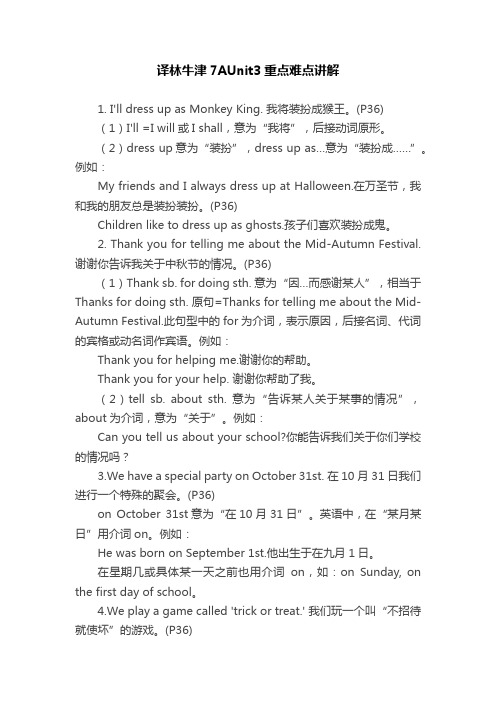
译林牛津7AUnit3重点难点讲解1. I'll dress up as Monkey King. 我将装扮成猴王。
(P36)(1)I'll =I will或I shall,意为“我将”,后接动词原形。
(2)dress up意为“装扮”,dress up as…意为“装扮成……”。
例如:My friends and I always dress up at Halloween.在万圣节,我和我的朋友总是装扮装扮。
(P36)Children like to dress up as ghosts.孩子们喜欢装扮成鬼。
2. Thank you for telling me about the Mid-Autumn Festival.谢谢你告诉我关于中秋节的情况。
(P36)(1)Thank sb. for doing sth. 意为“因…而感谢某人”,相当于Thanks for doing sth. 原句=Thanks for telling me about the Mid-Autumn Festival.此句型中的for为介词,表示原因,后接名词、代词的宾格或动名词作宾语。
例如:Thank you for helping me.谢谢你的帮助。
Thank you for your help. 谢谢你帮助了我。
(2)tell sb. about sth. 意为“告诉某人关于某事的情况”,about为介词,意为“关于”。
例如:Can you tell us about your school?你能告诉我们关于你们学校的情况吗?3.We have a special party on October 31st. 在10月31日我们进行一个特殊的聚会。
(P36)on October 31st意为“在10月31日”。
英语中,在“某月某日”用介词on。
例如:He was born on September 1st.他出生于在九月1日。
[译林版]7A Unit3 Welcome to our school知识点详解及练习
![[译林版]7A Unit3 Welcome to our school知识点详解及练习](https://img.taocdn.com/s3/m/69640718eff9aef8941e0674.png)
7A Unit 3 Welcome to our school知识点详解及练习一、词汇A. 根据汉语意思,写出单词1. He likes _______ (生物) best because he likes studying animals.2. —How’s your new _______ (地理) teacher?—He is very kind and helpful.3. Our new library looks _______ (现代的) and beautiful.4. Our classroom is very clean and _______ (明亮的).5. —Can I ________ (借) your pen?—Yes, you can.6. Many of my classmates keep ______ (日记) in English.7. We have a class ______ (会议) every Monday afternoon.8. _________(请再说一遍)? I didn’t hear your words just now.9. My mother and her friend are talking on the _______(电话).B. 词性转换1. The Greens always ______(have)a big dinner on Friday evenings.2. Ben and his parents live on the _______ (one) floor.3. My favourite football________ (play) is Kaka.4. My father or mother ________(cook)dinner at home every day.5. My brother often wears _______ ( glass).6. Classrooms are in that tall ______ (build).7. Every classroom ______ (have) a computer.8. Most Chinese ______(eat)moon cakes at the Mid-Autumn Festival.9. One of my parents ______(like)going shopping very much.10. You ______(not be)late for class, Sandy.二、语言·知识点Comic Strip &Welcome to the unit1.Which of the subjects do you like best?= ________ is ________ ________subject?①which[pron.]哪一个②best原形_________ 比较级____________【例题】1.你更喜欢哪个,茶还是果汁?_____________________________________2.--Can you give the chair ____me?--____________?1.for;Which chair B. to; Which one C. with; Where are2.So I can eat three.①so[conj.]因此,所以(不能和because同时出现)②so[adj.]如此的so big 如此多的人_________________如此多的作业___________________③so[adv.](表示程度)这样,如此I think so. / I hope so. / I am afraid so. Nothing so bad, as not to be good for something.塞翁失马,焉知非福。
新译林版英语七年级上册第3单元短语句子及重点讲解

7A第3单元短语、句子及重点讲解一、短语1、欢迎来我们学校welcome to our school2、最喜欢地理like Geography best3、在开放日on the Open Day4、举行家长会have a parents’ meeting5、在下午两点at two o’clock in the afternoon6、观摩我们两节课watch two of our lessons7、在校门口会面meet at the school gate8、看上去漂亮/现代化look beautiful/ modern 9、带你参观我们学校show you around our school10、如此大so big11、在教学大楼前面in front of the classroom building12、在一楼on the ground floor13、既干净又明亮clean and bright14、请走这边This way, please.15、一间美术室an art room16、开会have a meeting17、穿着白色衬衫的那个男子the man in a white shirt18、那边的楼房the building over there19、来参观我们学校come and visit our school20、在这一天on this day21、许多书lots of books/ many books22、学校礼堂the school hall23、在足球队里in the football team24、看着墙上我朋友们的画look at the pictures of my friends on the wall25、我所有的朋友all my friends26、告诉某人关于某事tell sb about sth27、告诉我们有关你学校的情况tell us about your school 28、和他们一起玩play with them29、向我/你/他/她问好say hello to me/you /him/her30、向我们道歉say sorry to us31、跟他们道别say goodbye to them32、路很远a long way33、从我家到学校from my home to the school34、到校get to school35、到家get home36、步行回家(两种)go home on foot =walk home 36、乘公交上学(两种)go to school by bus = take a bus to school 37、骑自行车去公园(3种)go to the park by bike =go to the park on a bike = ride a bike to the park38、开车上班(2种)go to work by car = drive to work39、半小时half an hour40、住在我们学校附近live near our school41、每天早晨6点半到校get to school at six every morning 42、从上午8点到下午5点半from 8a.m. to 5:30 p.m.43、仅仅下午开门be only open in the afternoon44、各种各样的书籍all kinds of books45、向图书馆借书borrow books from the library 46、在阅览室看书read books in the reading room47、唱英文歌曲sing the English song48、过马路cross the road49、在你上学途中on your way to school50、在我回家途中on my way home51、在她返回途中on her way back52、在希望中学学习study at Hope Middle School53、有几个教室have a few classrooms54、离学校很远far away from the school55、都很友好be all kind二、句子1、这些科目中你最喜欢哪一门?我最喜欢生物。
7A译林英语Unit 3 基础知识点

7A Unit 3 Welcome to our school! 知识清单一、Comic strip and Welcome to the unit1. Which of the subjects do you like best? = Which subject do you like best?你最喜欢哪个科目?= Which is your favourite subject?2. tell your friends about your school【tell sb. about sth.】拓展与区分:speak, tell, say, talk用法。
(1)speak + 语言如:speak Englishspeak to sb.(无说话内容)如:Don’t speak to me now.(2) say sth. to sb. 或say to sb, “ …… ” 【say后必须有说话内容】如:say hello/goodbye/sorry/thanks to sb. say it in English 【it是说话内容】(3) tell sb. sth. = tell sth. to sb. 【tell后接双宾语】如:tell me a story, tell us a joke拓展:ask/tell sb. to do sth. 叫某人去做某事ask/tell sb. not to do sth. 叫某人不要去做某事(4) talk to/with sb. talk about sth. 如:Tom is talking to Jack about the film.3.want her mother to come 想要她妈妈来【want sb. to do sth. =would like sb. to do sth.想要某做某事】4. on the Open Day 在开放日那天【具体某一天前用介词on】拓展:on Monday, on Sunday morning, on July 1st; on the evening of July 1st.5. What’s the date today? 【询问日期:今天几号?】= What date is it today?.拓展:What day is it today? 【询问周几:今天是星期几?】What time is it now? 【询问时间:现在几点了?】6. The parents’ meeting begins at two o’clock in the afternoon.家长会在下午两点开始。
(完整版)新译林七年级上册第三单元知识点梳理
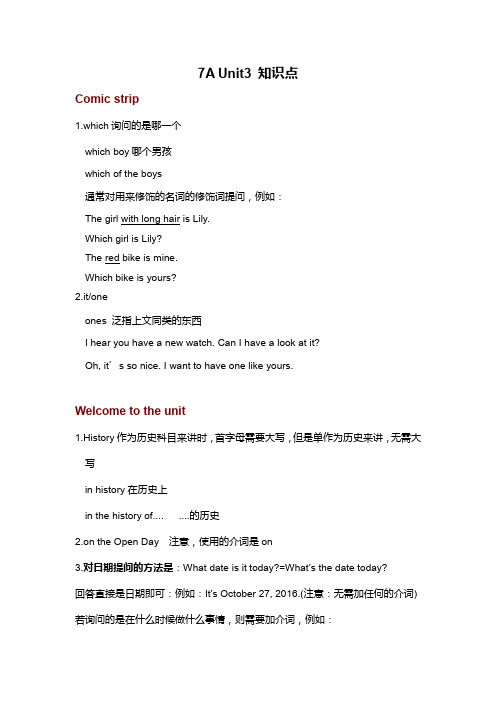
7A Unit3 知识点Comic strip1.which询问的是哪一个which boy哪个男孩which of the boys通常对用来修饰的名词的修饰词提问,例如:The girl with long hair is Lily.Which girl is Lily?The red bike is mine.Which bike is yours?2.it/oneones 泛指上文同类的东西I hear you have a new watch. Can I have a look at it?Oh, it’s so nice. I want to have one like yours.Welcome to the unit1.History作为历史科目来讲时,首字母需要大写,但是单作为历史来讲,无需大写in history在历史上in the history of…. ….的历史2.on the Open Day 注意,使用的介词是on3.对日期提问的方法是:What date is it today?=What’s the date today?回答直接是日期即可:例如:It’s October 27, 2016.(注意:无需加任何的介词)若询问的是在什么时候做什么事情,则需要加介词,例如:When do you have a test?We have a test on October 27, 2016.对星期提问的方法:What day is it today?= What’s the day today?今天是星期几?回答:It is Thursday.对点时间提问的方法:What time is it?= What’s the time?回答:It’s 17:23.4.家长会the parents’ meeting 注意,parents’使用的是复数名词的名词所有格形式,直接在其后面加’have a parents’ meetingat the parents’ meeting在具体的点时间前加的是介词at at ten o’clock在上下午,使用的介词是in in the morning/ evening/ afternoon在学校门口用的是介词at at the school gateReading1.be ready to do sth. 准备做某事,后加动词不定式I’m ready to buy you a new dress.2.so + adj./ adv. 例如:so big/fat/beautiful3.show(1)show sb. around 带某人参观某地注意:此处sb.应使用的是宾格,show为动词,动词后加人称代词宾格形式,构成动宾。
译林版英语七年级上册unit3知识点
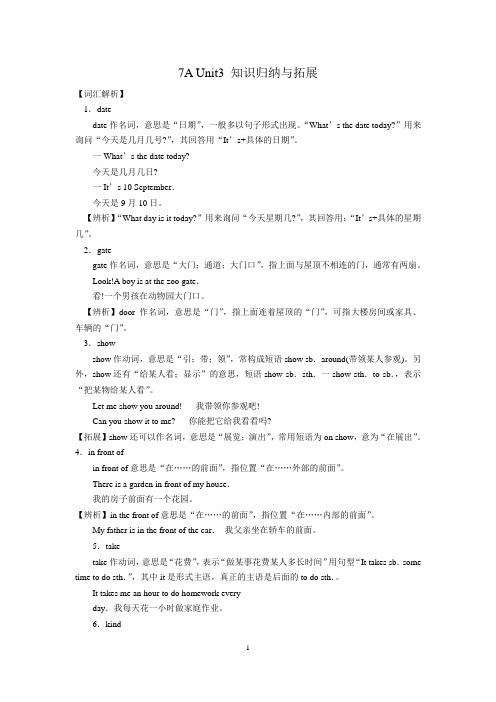
7A Unit3 知识归纳与拓展【词汇解析】1.datedate作名词,意思是“日期”,一般多以句子形式出现。
“What’s the date today?”用来询问“今天是几月几号?”,其回答用“It’s+具体的日期”。
一What’s the date today?今天是几月几日?一It’s 10 September.今天是9月10日。
【辨析】“What day is it today?”用来询问“今天星期几?”,其回答用:“It’s+具体的星期几”。
2.gategate作名词,意思是“大门;通道;大门口”,指上面与屋顶不相连的门,通常有两扇。
Look!A boy is at the zoo gate.看!一个男孩在动物园大门口。
【辨析】door作名词,意思是“门”,指上面连着屋顶的“门”,可指大楼房间或家具、车辆的“门”。
3.showshow作动词,意思是“引;带;领”,常构成短语show sb.around(带领某人参观)。
另外,show还有“给某人看;显示”的意思,短语show sb.sth.一show sth.to sb.,表示“把某物给某人看”。
Let me show you around! 我带领你参观吧!Can you show it to me? 你能把它给我看看吗?【拓展】show还可以作名词,意思是“展览;演出”,常用短语为on show,意为“在展出”。
4.in front ofin front of意思是“在……的前面”,指位置“在……外部的前面”。
There is a garden in front of my house.我的房子前面有一个花园。
【辨析】in the front of意思是“在……的前面”,指位置“在……内部的前面”。
My father is in the front of the car.我父亲坐在轿车的前面。
5.taketake作动词,意思是“花费”,表示“做某事花费某人多长时间”用句型“It takes sb.some time to do sth.”,其中it是形式主语,真正的主语是后面的to do sth.。
[译林版]7A Unit3 Welcome to our school知识点详解及练习
![[译林版]7A Unit3 Welcome to our school知识点详解及练习](https://img.taocdn.com/s3/m/69640718eff9aef8941e0674.png)
7A Unit 3 Welcome to our school知识点详解及练习一、词汇A. 根据汉语意思,写出单词1. He likes _______ (生物) best because he likes studying animals.2. —How’s your new _______ (地理) teacher?—He is very kind and helpful.3. Our new library looks _______ (现代的) and beautiful.4. Our classroom is very clean and _______ (明亮的).5. —Can I ________ (借) your pen?—Yes, you can.6. Many of my classmates keep ______ (日记) in English.7. We have a class ______ (会议) every Monday afternoon.8. _________(请再说一遍)? I didn’t hear your words just now.9. My mother and her friend are talking on the _______(电话).B. 词性转换1. The Greens always ______(have)a big dinner on Friday evenings.2. Ben and his parents live on the _______ (one) floor.3. My favourite football________ (play) is Kaka.4. My father or mother ________(cook)dinner at home every day.5. My brother often wears _______ ( glass).6. Classrooms are in that tall ______ (build).7. Every classroom ______ (have) a computer.8. Most Chinese ______(eat)moon cakes at the Mid-Autumn Festival.9. One of my parents ______(like)going shopping very much.10. You ______(not be)late for class, Sandy.二、语言·知识点Comic Strip &Welcome to the unit1.Which of the subjects do you like best?= ________ is ________ ________subject?①which[pron.]哪一个②best原形_________ 比较级____________【例题】1.你更喜欢哪个,茶还是果汁?_____________________________________2.--Can you give the chair ____me?--____________?1.for;Which chair B. to; Which one C. with; Where are2.So I can eat three.①so[conj.]因此,所以(不能和because同时出现)②so[adj.]如此的so big 如此多的人_________________如此多的作业___________________③so[adv.](表示程度)这样,如此I think so. / I hope so. / I am afraid so. Nothing so bad, as not to be good for something.塞翁失马,焉知非福。
新译林版英语七年级上册第三单元语法7Aunit3

Presentation
I am a teacher. My students like _m__e.
You are students. I teach _y_o_u English.
She is a girl. We call _h_e_r_ Lucy.
He is a boy. All the boys like _h_i_m_ because he is good at football.
___W__e,__y_o_u_a_n_d_t_h_e_y_a_r_e_f_r_o_m__C_h_i_n_a_.
4、在简短对话中,当人称代词单独使用或在not 后多用宾格.
— I like English. — _____ too.
A. I B. He C. Me
一.人称代词
5、it 的特殊用法
① it 可指不知性别的婴儿或不确指性别的人.
Unit 3 Grammar
Presentation
_I_ am Kitty. This is Amy. _S_h_eis my classmate. W__e_ are good friends. W__e_ like playing volleyball. _It_ is very interesting. Peter and Simon are my classmates, too.T_h__ey_ like playing football very much.What do _y_o_u_ like?
二、用法举例:
1. My name is Millie. I live in Beijing. ( I代自己, Millie )
2. Are you in Class1, Grade7, Andy? ( you代对方,指Andy )
译林版初一英语7AUnit3Welcometoourschool!知识点同步梳理

译林版初一英语7AUnit3Welcometoourschool!知识点同步梳理牛津译林版7AUnit3知识点同步梳理词汇1. each用法①each后面如果需要加名词,则名词用单数形式。
each of后面如果需要加名词,则需要用the+名词复数形式。
②each放句首,句子的谓语动词用三单。
each放句中,则句子的谓语动词用复数形式例1:Each of the students ___________ (not be) good at swimming.例2:He gives a book to each of his _____________(父母).例3:We each ____________(有) our own office.例4:Each ______________(man) knows that.Keys: isn’t; parents; have; maneach和every的区别each指两个或两个以上的人或事物中的“每个”;every是指三个以上的人或事物的“全体”。
例1:_____________(每个)side of the road is clean.Key: Each2、时间介词 in on at①介词on用在时间上,表示某一具体的时间。
通常后面加具体的日期或星期,以及被修饰过的上下午如:on Sunday morning, on July ,25.②介词in用在时间上,表示在某一特定时间里,或者某段时间之后。
通常后面加年、月、季、上下午或一段时间如:in the morning, in a week.③介词at用在在时间上,是用某一点时间前面,以及不加day的节日前面如:at six o'clock.例1:We don’t have classes __________ Sunday morning.A. inB. onC. atD. to例2:_____________ a cold winter morning, we went back to our country.A. inB. onC. atD. to例3:We always have fun __________ summer holiday.A. inB. onC. atD. to例4:I was 9 years old ______________ 2014.A. inB. onC. atD. to例5:We always have a dragon boat race ______________ Dragon Boat Festival.A. inB. onC. atD. toKeys: B; B; A; A; C3、系动词分类:be感官系动词:look(看上去)sound(听上去)smell(闻上去)touch(摸上去)等变得turn、become保持keep、stay系动词后面需要加形容词,构成系表结构例1:This flower smells very __________(好)例2:You look so _____________(高兴)Keys: good; happy注:well (adj)身体健康的(adv)好的例1:Does your mother feel _____________(好)?Key: well4、in、wear、with表示穿的区别wear表示穿着,是动词。
译林版初一英语7A Unit3 Welcome to our school! 知识点精讲精练
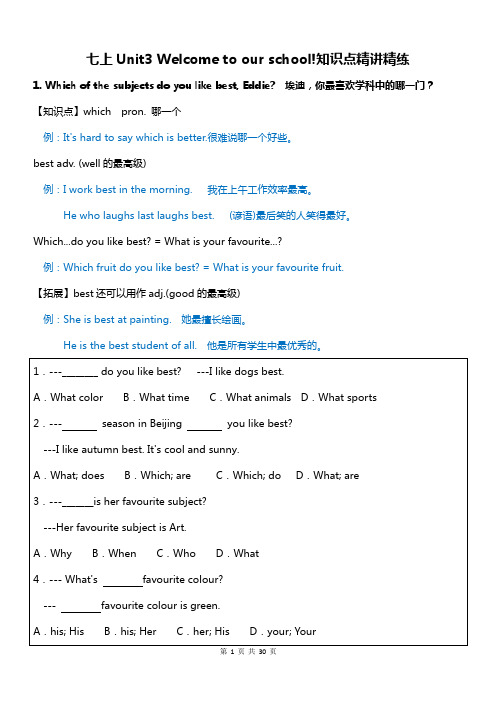
七上Unit3 Welcome to our school!知识点精讲精练1.Which of the subjects do you like best, Eddie? 埃迪,你最喜欢学科中的哪一门?【知识点】which pron. 哪一个例:It's hard to say which is better.很难说哪一个好些。
best adv. (well的最高级)例:I work best in the morning. 我在上午工作效率最高。
He who laughs last laughs best. (谚语)最后笑的人笑得最好。
Which...do you like best? = What is your favourite...?例:Which fruit do you like best? = What is your favourite fruit.【拓展】best还可以用作adj.(good的最高级)例:She is best at painting. 她最擅长绘画。
He is the best student of all. 他是所有学生中最优秀的。
2.Look! I have two cakes, and you have one. So I can eat three!看!我有两块你有一块。
因此我能吃三块蛋糕!【知识点】替代词:it代指同类同物,one代指同类异物。
例:I have a book. It is new. 我有一本书,它是新的。
Your dictionary is good. I want to buy one too. 你的字典很好,我也想买一本。
【辨析】It,one,ones,that和thoseit特指,代替前文提到过的事物。
(同类同物)例:He is eating a banana. It looks delicious.one泛指,代替单数名词,可指人或物。
苏教版译林英语7A Unit 3知识点
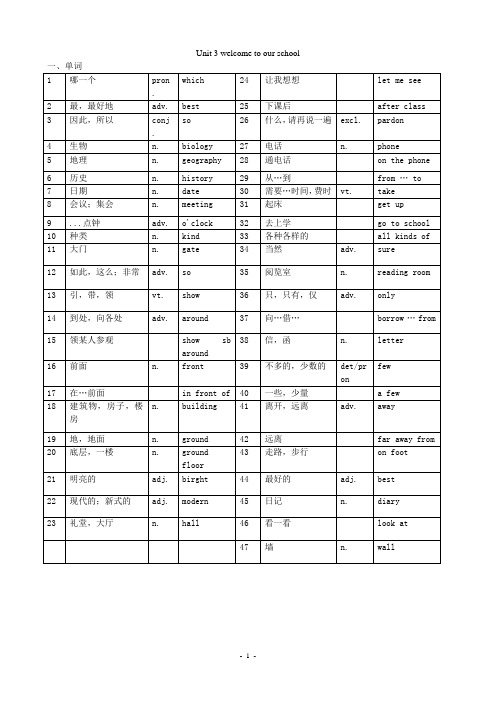
Unit 3 welcome to our school二、短语三、句子四、语法1、be动词She is a good student (改为否定句,一般疑问句)She is not a good student.Is she a good student?第一单元语法主要是be动词的用法,我是am 你是are ,is连着他、她、她,复数全部都是areI am ;you are ;he/she/it is,2、实义动词He does his homework.(改为否定句和一般疑问句)He doesn't do his homeworkDoes he do his homework? 这里原句中的does是实义动词do的第三人称形式,He enjoys listening to music.(改为否定句和一般疑问句)He doesn't enjoy listening to musicDoes he enjoy listening to mucic?实义动词变否定句在前面加助动词don't/doesn't,并把动词变为原形实义动词变疑问句,在句首加do/does,并把动词变成原形。
总结:当对一个句子进行变化时,首先看句子的动词是什么,一个简单的句子只会有一个谓语动词,动词如果是be动词,就按be动词的用法该,就是否定句在be动词后面加not,疑问句就是将be动词提到句首。
如果是实义动词就按实义动词的用法来,否定句在实义动词前面加don't/doesn't,疑问句就是将does或者do 提到句首。
考点经常是主语是三单时,动词要是第三人称形式重点:以下词语做主语时,看做三单●人称代词she he it●单独的人名、地名、物名或者称呼语,如Beijing ,Mary●单数可数名词,如A bike is under the tree. The red bike is my mother's●不可数名词做主语时,视为第三人称单数,如,The milk is in the cup.●用单个的数字、字母、或则算式做主语时,看做三单,如,Five and eight is thirteen.●One 或者“one of +复数名词/代词”做主语时,是三单,如,one of us is a member of the Reading Club●不定代词everyone, someone ,somebody nobody something ,anything 等做主语时,看做三单,Is everyonehere today ?今天大家都到这了吗?●动名词当主语时,当做三单,如swimming is good for us .因为动词是不能当主语的,动词必须加上ing才能当主语。
新苏教译林版7AUnit 3 知识点总结

Unit3 Welcome to our school!知识点总结一、词组1、一些蛋糕和面包some cakes and bread2、举行家长会have the parents’ meeting3、在校园开放日On the School Open Day4、观摩我们的两节课watch two of our lessons5、在校大门口见面meet at the school gate6、如此美丽so beautiful7、干净而明亮clean and bright8、带某人参观…show sb around9、在教学楼前面in front of the classroom building10、在底楼on the ground / first floor11、走这边This way, please.12、一间美术室和阅览室an art room and a reading room13、看上现代化look modern14、那儿的那栋楼the building over there15、穿白衬衫的男的The man in a white shirt16、帮我学英语help me with / learn my English17、叫我们中文teach us Chinese18、和某人打招呼/ 告别/说抱歉say hello / goodbye / sorry to sb19、听得清楚hear sb well / clearly20、通过电话交谈talk on the phone21、骑自行车上学go to school by like / on one’s bikeride a bike to school22、乘公交车上班go to work by bus / on a bustake a bus to work23、步行回家go home on foot = walk home24、到达学校get to school = arrive at school25、到达家/ 这儿/那儿get home / here / there26、起床get up27、从…到…from… to…28、半小时half an hour29、各种各样的书all kinds of books30、从图书馆借书borrow some books from the library31、感谢你的来信Thanks for your letter.Thanks for writing the letter to me.32、一些,少量的 a few / a little33、离….遥远far away from34、一切顺利,万事如意All the best35、出示给某人看…show sth to sb = show sb sth二、句型和知识点:1、so: 1)(连词)因此,所以(不能和_________同时出现)2)如此的so big / ____________ (如此多的人) / __________________(如此多的作业)3)代替上文说的内容(代词)I think so. / I hope so. / I am afraid so.2、Which subject do you like best? = ________ is _______ ________subject?3、对点钟、星期几、日期的不同提问:1)The meeting begins at 2:30 p.m. ---- ______ _______ ________the meeting_______?2)It’s Monday today. ---- _______ ________ is it today?3)It’s was October 12th yesterday. ---- _________ ________ ______ ________yesterday?4) The shop is open from 8:00 a.m. to 10:30 p.m. --- _________ _______ theshop ________?4、区别in front of / in the front of5、区别不同的穿的表达:1)in 穿着(表状态)+衣服/ 颜色the boy in blue / a woman in a red dress区别于with the girl ______ long hair / glasses2)wear 穿、戴着(表状态)like to wear / wearing…3)put on穿上、戴上(强调动作过程)put it / them on -----___________(脱)Ex.1) Lucy likes _________ red. But today she __________ a purple blouse.2) Do you know the boy ______ the jeans?3) It’s very cold outside. Please ____________ your warm coat, or you willcatch a cold.6、borrow sth from sb (借进)/ lend sth to sb(借出)7、Thank you for sth. / Thanks for doing sth.Thanks for your help.= Thank you for _______ ______.8、结构:It takes sb some time to do sth. = sb spend some time doing sth.例如:It takes me about 30 minutes to get to school.= _____ ______ about half an hour _______ to school.提问:______ _____ ______ it _______ you _______ _______ to school?9、对交通方式的提问:How do you get to school? On foot / By bus....10、区别a few / a little 少量的few / little表示否定(几乎没有) a few + n.[c] a little + n. [u]1) He has_________ friends and often goes to visit them.2) There is _______water in the bottle,let’s go to buy some.11、open / close (v.) 开/ 关(表动作)be open / be closed (adj.) 开着/ 关着(表状态)1)The supermarket _____________ from 7:00 a.m. to 10:30 p.m.2) Don’t ____ the door. It’s too hot.3) Keep the windows _________. There is a strong wind.4) The shop ______at 7:00a.m. and ________ at 10 p.m. every day.12、kind: 1) 种类n. a kind of / different kinds of / many kinds of / all kinds of2) 热情的,好的be kind to sbOur teachers__________________________.(都对我们很好)三、语法:人称代词主格和宾格的用法主格I you he it we they宾格her you注意:1、顺序you, she and I (单数) we, you and they (复数)2、动词和介词后面用宾格between _____________(我和他)teach______ (我们)English3、区别it / one: it代替上文提到的那样东西one 只能代替可数名词,同类不同物如:1) Who is knocking at the door? ____ may be Jim.2) Kate buys a new computer. I also want to buy ____.3)Do you have a pen? Sorry, I don’t have ______.4)There’s a book on the ground. Is _____ yours?。
初一英语译林版7A Unit3 welcome to our school 同步基础知识梳理+写作能力提升+首字母和任务型阅读

学科教师辅导讲义学员编号:年级:初一课时数:3学员姓名:辅导科目:英语学科教师:授课T 7A Unit3 同步知识梳理(下)T 写作能力提升T首字母和任务型阅读类型授课日期时段教学内容一、同步知识梳理知识点1:It is a long way from my home to the school.从我家到学校有很长一段路。
(P38)(1)it在此句中指代路程。
it还可用来指代时间、距离及天气等自然现象。
eg.It is Sunday today.It is five minutes' walk from my home to the shop.It is fine today.(2)from…to…意为“_______”。
from…to…意为“从……到……”,可连接两个并列的句子成分。
eg. I watch TV from 9 to 11 in the evening.It is about 20 kilometres from the park to the bus stop.知识点2: It takes me about 2 hours.它大约花费我2小时。
(P38)take在此意为“花费(时间)”。
eg.I like watching TV. But it takes much time.take意为“花费(时间)”时常构成句型:It takes sb. some time to do sth.做某事花费某人一些时间。
eg.It often takes me two hours to do my homework.知识点3 : When is it open? It’s open from 8 a.m. to 5:30 p.m.它什么时候开门?它从上午8点到下午5:30开门。
(P38) (1)open在此用作形容词,意为“开着的”,open用作形容词时常放在名词前作定语或连系动词后作表语。
苏教版新译林七年级7A语法点整理
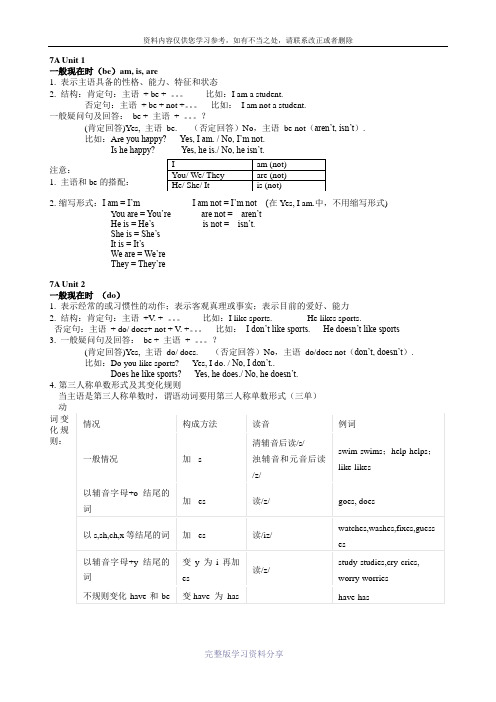
7A Unit 1 一般现在时(be )am, is, are1. 表示主语具备的性格、能力、特征和状态2. 结构:肯定句:主语 + be + 。
比如:I am a student.否定句:主语 + be + not +。
比如: I am not a student.一般疑问句及回答: be + 主语 + 。
?(肯定回答)Yes, 主语 be. (否定回答)No ,主语 be not (aren’t, isn’t ).比如:Ar e you happy? Yes, I am. / No, I’m not.Is he happy? Yes, he is./ No, he isn’t.注意: 1. 主语和be 的搭配:2. 缩写形式:I am = I’m I am not = I’m not (在Yes, I am.中,不用缩写形式)Y ou are = You’re are not = aren’tHe is = He’s is not = isn’t.She is = She’sIt is = It’sWe are = We’reThey = They’re7A Unit 2 一般现在时 (do )1. 表示经常的或习惯性的动作;表示客观真理或事实;表示目前的爱好、能力2. 结构:肯定句:主语 +V. + 。
比如:I like sports. He likes sports.否定句:主语 + do/ does+ not + V . +。
比如: I don’t like sports. He doesn’t like sports3. 一般疑问句及回答: be + 主语 + 。
?(肯定回答)Yes, 主语 do/ does. (否定回答)No ,主语 do/does not (don’t, doesn’t ). 比如:Do you like sports? Yes, I do. / No, I don’t..Does he like sports? Yes, he does./ No, he doesn’t.4. 第三人称单数形式及其变化规则当主语是第三人称单数时,谓语动词要用第三人称单数形式(三单)动词变化规则:7AUnit 3人称代词1. 代替人或物的名词2. 人称代词的主格在句子中做主语,一般位于句首。
- 1、下载文档前请自行甄别文档内容的完整性,平台不提供额外的编辑、内容补充、找答案等附加服务。
- 2、"仅部分预览"的文档,不可在线预览部分如存在完整性等问题,可反馈申请退款(可完整预览的文档不适用该条件!)。
- 3、如文档侵犯您的权益,请联系客服反馈,我们会尽快为您处理(人工客服工作时间:9:00-18:30)。
Unit 3 welcome to our school
二、短语
三、句子
四、语法
1、be动词
She is a good student (改为否定句,一般疑问句)
She is not a good student.
Is she a good student?
第一单元语法主要是be动词的用法,我是am 你是are ,is连着他、她、她,复数全部都是are
I am ;you are ;he/she/it is,
2、实义动词
He does his homework.(改为否定句和一般疑问句)
He doesn't do his homework
Does he do his homework? 这里原句中的does是实义动词do的第三人称形式,
He enjoys listening to music.(改为否定句和一般疑问句)
He doesn't enjoy listening to music
Does he enjoy listening to mucic?
实义动词变否定句在前面加助动词don't/doesn't,并把动词变为原形
实义动词变疑问句,在句首加do/does,并把动词变成原形。
总结:当对一个句子进行变化时,首先看句子的动词是什么,一个简单的句子只会有一个谓语动词,动词如果是be动词,就按be动词的用法该,就是否定句在be动词后面加not,疑问句就是将be动词提到句首。
如果是实义动词就按实义动词的用法来,否定句在实义动词前面加don't/doesn't,疑问句就是将does或者do 提到句首。
考点经常是主语是三单时,动词要是第三人称形式
重点:以下词语做主语时,看做三单
●人称代词she he it
●单独的人名、地名、物名或者称呼语,如Beijing ,Mary
●单数可数名词,如A bike is under the tree. The red bike is my mother's
●不可数名词做主语时,视为第三人称单数,如,The milk is in the cup.
●用单个的数字、字母、或则算式做主语时,看做三单,如,Five and eight is thirteen.
●One 或者“one of +复数名词/代词”做主语时,是三单,如,one of us is a member of the Reading Club ●不定代词everyone, someone ,somebody nobody something ,anything 等做主语时,看做三单,Is everyone
here today ?今天大家都到这了吗?
●动名词当主语时,当做三单,如swimming is good for us .因为动词是不能当主语的,动词必须加上ing
才能当主语。
●疑问代词当主语时,如,who gives you a flower? 因为不知道具体是几个人给的,所以当单数看
●当and连接的两个名词在意义上指的是一个人,如,A teacher and writer is coming tomorrow.一位教师
兼作家明天要来。
这里的虽然有and但是这是一个人因为只有老师前面有冠词a,而writer前面没有冠词,所以说明是一个人。
而A teacher and a writer are coming tomorrow.这句话里就是两个人,因为有两个冠词
●经常错的
My name, your school ,your father,这是都是看my your 后面的词的单复数
如,My name is Mary name 是单的所以用is
Your school is big school 是单的所以用is
His friends are all nice to me friends 是复数所以用are。
